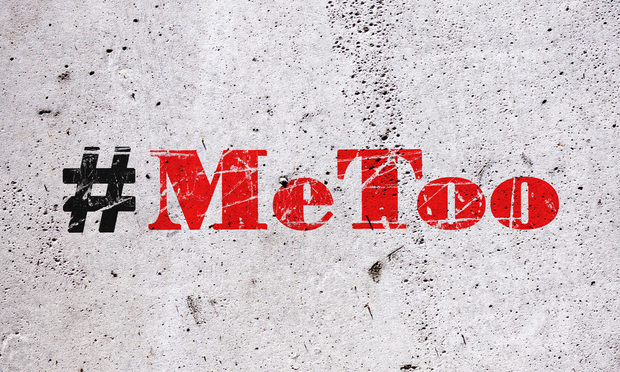Will #MeToo Movement Affect Attorney Discipline for Domestic Violence?
The case of a New Jersey lawyer suspended from practice after a conviction for simple assault provides a window into the issue, if not an answer to the question.
August 22, 2018 at 09:00 AM
8 minute read
 Credit: Cebas
Credit: Cebas
The tightening of penalties for lawyers committing domestic violence offenses in the 1990s—while a national spotlight focused on abuse of women by husbands, partners and boyfriends—begs the question: should today's #MeToo movement, fueled by a sense of outrage over abuse of power, dictate another ratcheting up of discipline?
The case of a New Jersey lawyer suspended from practice after a conviction for simple assault provides a window into the issue, if not an answer to the question.
Meanwhile, ethics lawyers say a dramatic shift probably isn't in the offing.
Ty Hyderally, a Montclair employment lawyer, was issued a three-month suspension last June 22 after he was convicted of assaulting a woman at his residence. Hyderally did not accept responsibility for his conduct, according to the Disciplinary Review Board, which noted that he was disciplined once before, for making sexual advances to two women who were his legal aid clients.
The DRB recommended a three-month suspension by a 5-2 vote, with the minority calling for Hyderally to be suspended for six months.
The DRB, in its decision, noted that attorneys who were convicted of acts of domestic violence typically drew a reprimand—until the mid-1990s. The decision noted that the Supreme Court, citing what it said was growing intolerance of domestic violence in society, imposed a public reprimand in a March 1995 case, In re Magid, while announcing that discipline greater than a reprimand would be imposed in future domestic violence cases.
In Magid, the court said, “the national spotlight is focused on domestic violence,” citing statistics from congressional hearings on the subject, as well as the state Legislature's 1991 enactment of the Prevention of Domestic Violence Act, which it described as “one of the toughest domestic violence laws in the nation.”
The murder of Nicole Brown Simpson and her friend Ron Goldman in June 1994, and the subsequent murder trial of O.J. Simpson, which ended in acquittal in October 1995, also served to focus public attention on domestic violence.
And in July 1997, when the next lawyer discipline case involving domestic violence came before the New Jersey Supreme Court, In re Margrabia, the justices made good on their promise: the respondent in that case, who was convicted of simple assault, was suspended from practice for three months, the same punishment issued to Hyderally earlier this year.
The DRB said Hyderally was fined $414 in connection with his assault conviction in Montclair Municipal Court. He was accused of causing bruises to the neck and jaw of a woman identified as M.C., as well as significant bruises on her left arm. She claimed she was trying to leave his condominium when he tried to stop her, throwing her against the wall and placing his hands on her neck, the board said. She reported the incident to police, who took pictures of the bruises, but Hyderally accused her of inflicting the neck wounds herself, and said her other bruises may have occurred when he was trying to defend himself from her kicks, according to the document.
Hyderally appealed the municipal court ruling in the Law Division in Essex County, where Superior Court Judge Martin Cronin found him guilty and affirmed the fines previously imposed, the DRB noted.
In the ensuing disciplinary case, the Office of Attorney Ethics urged the DRB to impose a three-month suspension, citing New Jersey precedent, and noting the absence of mitigating factors and the presence of aggravating ones. The OAE said Hyderally failed to demonstrate remorse for his actions, and it cited his previous reprimand for making sexual advances to two clients.
In 1999 the DRB brought a reciprocal discipline case against Hyderally based on a decision by the judge advocate general of the U.S. Navy. Hyderally, while serving as a lieutenant and judge advocate in Sasebo, Japan, was accused of inappropriate conduct by two women who sought his counsel for divorces. The Navy commanding officer found that in one case, in July 1996, Hyderally asked the client, “after your divorce, how many guys are in line?” and “I bet you can do the wild sex,” or words to that effect. In the second case, in December 1996, the commanding officer found Hyderally locked his office door, then asked the client, “how long since you had sex,” or words to that effect, asked her to kiss him and invited her to his house for a drink. The judge advocate general found Hyderally violated the Uniform Code of Military Justice, and suspended his certification to practice law before Navy courts for two years, according to the documents.
When that matter came before the DRB, Hyderally argued that he was denied due process in the JAG's ethics proceedings, but the board found that he was represented by counsel and had waived the right to a hearing. The New Jersey Supreme Court issued him a reprimand in that case.
Hyderally's prior discipline is an aggravating factor, the DRB said in 2017. And he provided no compelling mitigation, the board said. Hyderally contended that his actions in the domestic incident were caused by an adverse reaction to Adderall, a drug prescribed for attention deficit hyperactivity disorder. But the DRB dismissed that claim, finding that Hyderally gave no indication who prescribed the drug, when it was prescribed, and whether he was under its influence at the time of the incident with M.C.
The Supreme Court, in adopting the DRB majority's recommended discipline, order that, before Hyderally is reinstated from his three-month suspension, he must submit proof of completion of anger-management counseling. The Supreme Court did allow his law office to remain open during his suspension, so five attorneys and five support staff employed there do not become unemployed. But Hyderally may not receive any financial benefit from his firm during the period of suspension, the court ordered.
Hyderally did not respond to a message left at his law office. He was represented before the DRB by Gerard Hanlon of Hanlon Dunn Robertson Schwartz in Morristown, who also didn't return calls seeking comment.
Marc Garfinkle, an attorney who represents attorneys in ethics proceedings, said Hyderally's three-month suspension represents “a very good result” obtained by Hanlon. Garfinkle noted that the three-month baseline discipline is supposed to be increased in the presence of aggravating factors and the absence of mitigation.
“What I think is troubling is that, looking at Hyderally's record, one would have to say, 'wow, if this was the starting point, what do you have to do to get past three months?'” Garfinkle said.
Garfinkle called the DRB opinion “very thorough” and said he usually agrees with its determinations. But in the present case, “reading the facts, I thought Hyderally would not have been able to get only a three-month suspension without a strong showing of mitigating circumstances. And the court found there were none,” he said.
Still, Garfinkle warned against changes to the disciplinary system.
“The primary purpose of attorney discipline is not to punish the attorney, but to preserve confidence in the bar,” he said.
According to Leslie Levin, a professor at the University of Connecticut School of Law who studies attorney discipline, Hyderally's three-month suspension falls “in line” with penalties handed to lawyers convicted of domestic violence in other states.
“I think there's a strong case that disciplinary authorities have to be consistent. The main thing you're trying to do is protect the public,” Levin said.
And as to whether the #MeToo movement will prompt stricter disciplinary actions against lawyers convicted of domestic violence, Levin cautioned that the main focus of the movement is sexual harassment and unwelcome advances in the workplace, not necessarily physical abuse.
“I don't see any impact yet. I think increased sensitivity to the perspective of women concerning physical abuse may ultimately effect the lawyer disciplinary process, but I also think it's too soon,” she said.
Robyn Hill, who was chief counsel for the DRB when it adopted the enhanced penalty for domestic violence by lawyers in In re Magid, said the #MeToo movement might prompt a larger number of complaints accusing attorneys of domestic violence.
“I think the court's actions frequently are effected by changing times and changing values,” Hill said. But “I don't think constantly ratcheting up discipline for offenses is necessarily productive.”
This content has been archived. It is available through our partners, LexisNexis® and Bloomberg Law.
To view this content, please continue to their sites.
Not a Lexis Subscriber?
Subscribe Now
Not a Bloomberg Law Subscriber?
Subscribe Now
NOT FOR REPRINT
© 2025 ALM Global, LLC, All Rights Reserved. Request academic re-use from www.copyright.com. All other uses, submit a request to [email protected]. For more information visit Asset & Logo Licensing.
You Might Like
View All

Trending Stories
- 1Troutman Pepper, Claiming Ex-Associate's Firing Was Performance Related, Seeks Summary Judgment in Discrimination Suit
- 2Law Firm Fails to Get Punitive Damages From Ex-Client
- 3Over 700 Residents Near 2023 Derailment Sue Norfolk for More Damages
- 4Decision of the Day: Judge Sanctions Attorney for 'Frivolously' Claiming All Nine Personal Injury Categories in Motor Vehicle Case
- 5Second Judge Blocks Trump Federal Funding Freeze
Who Got The Work
J. Brugh Lower of Gibbons has entered an appearance for industrial equipment supplier Devco Corporation in a pending trademark infringement lawsuit. The suit, accusing the defendant of selling knock-off Graco products, was filed Dec. 18 in New Jersey District Court by Rivkin Radler on behalf of Graco Inc. and Graco Minnesota. The case, assigned to U.S. District Judge Zahid N. Quraishi, is 3:24-cv-11294, Graco Inc. et al v. Devco Corporation.
Who Got The Work
Rebecca Maller-Stein and Kent A. Yalowitz of Arnold & Porter Kaye Scholer have entered their appearances for Hanaco Venture Capital and its executives, Lior Prosor and David Frankel, in a pending securities lawsuit. The action, filed on Dec. 24 in New York Southern District Court by Zell, Aron & Co. on behalf of Goldeneye Advisors, accuses the defendants of negligently and fraudulently managing the plaintiff's $1 million investment. The case, assigned to U.S. District Judge Vernon S. Broderick, is 1:24-cv-09918, Goldeneye Advisors, LLC v. Hanaco Venture Capital, Ltd. et al.
Who Got The Work
Attorneys from A&O Shearman has stepped in as defense counsel for Toronto-Dominion Bank and other defendants in a pending securities class action. The suit, filed Dec. 11 in New York Southern District Court by Bleichmar Fonti & Auld, accuses the defendants of concealing the bank's 'pervasive' deficiencies in regards to its compliance with the Bank Secrecy Act and the quality of its anti-money laundering controls. The case, assigned to U.S. District Judge Arun Subramanian, is 1:24-cv-09445, Gonzalez v. The Toronto-Dominion Bank et al.
Who Got The Work
Crown Castle International, a Pennsylvania company providing shared communications infrastructure, has turned to Luke D. Wolf of Gordon Rees Scully Mansukhani to fend off a pending breach-of-contract lawsuit. The court action, filed Nov. 25 in Michigan Eastern District Court by Hooper Hathaway PC on behalf of The Town Residences LLC, accuses Crown Castle of failing to transfer approximately $30,000 in utility payments from T-Mobile in breach of a roof-top lease and assignment agreement. The case, assigned to U.S. District Judge Susan K. Declercq, is 2:24-cv-13131, The Town Residences LLC v. T-Mobile US, Inc. et al.
Who Got The Work
Wilfred P. Coronato and Daniel M. Schwartz of McCarter & English have stepped in as defense counsel to Electrolux Home Products Inc. in a pending product liability lawsuit. The court action, filed Nov. 26 in New York Eastern District Court by Poulos Lopiccolo PC and Nagel Rice LLP on behalf of David Stern, alleges that the defendant's refrigerators’ drawers and shelving repeatedly break and fall apart within months after purchase. The case, assigned to U.S. District Judge Joan M. Azrack, is 2:24-cv-08204, Stern v. Electrolux Home Products, Inc.
Featured Firms
Law Offices of Gary Martin Hays & Associates, P.C.
(470) 294-1674
Law Offices of Mark E. Salomone
(857) 444-6468
Smith & Hassler
(713) 739-1250








